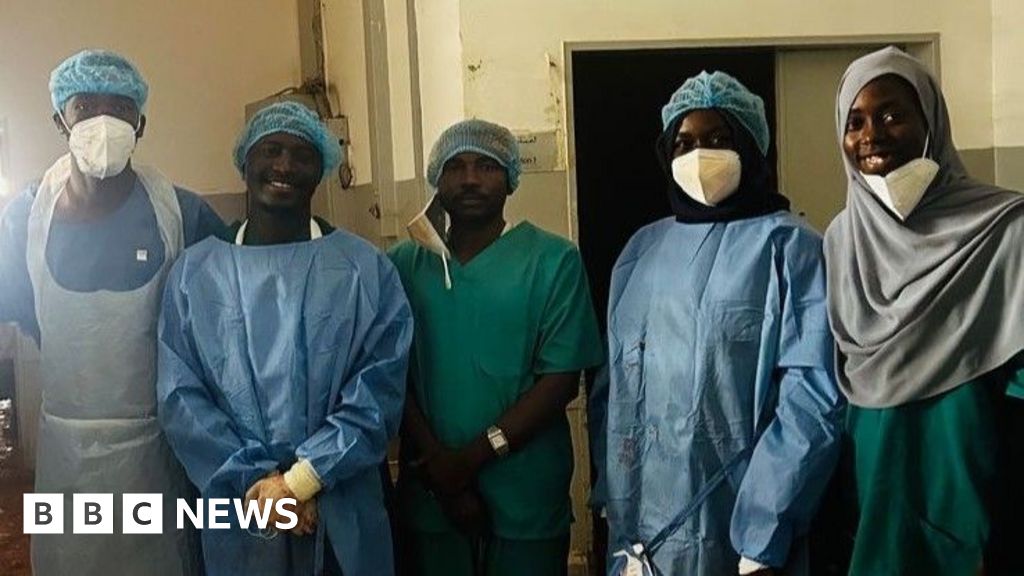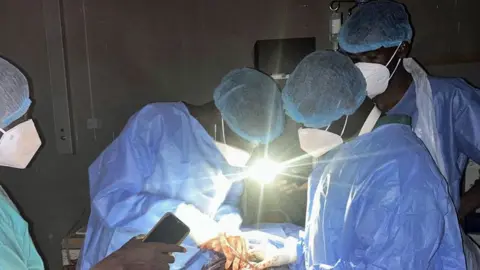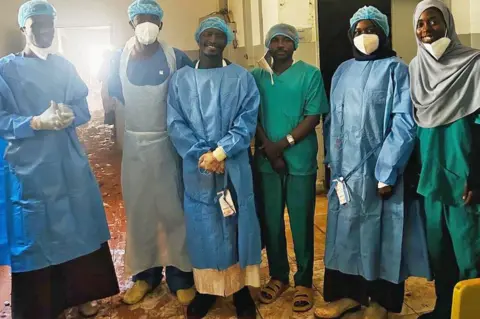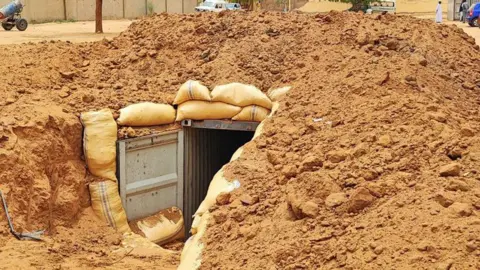Physical Address
304 North Cardinal St.
Dorchester Center, MA 02124
Physical Address
304 North Cardinal St.
Dorchester Center, MA 02124

 Mudathir Ibrahim Suleiman
Mudathir Ibrahim SuleimanDr. Mustafa Ali Abdulrahman Ibo and his colleagues bravely perform surgery under increasing bombardment at the last remaining hospital in el-Fasher, a town that has been under siege for the past nine months in Sudan’s western Darfur region .
During the last month, the hospital recorded 28 deaths and more than 50 injuries among its staff and patients due to intense shelling. This is the highest number of victims recorded in a month since the siege began.
“The recent continuous attacks on the Saudi hospital have escalated dramatically, they have become part of our daily lives,” Dr Ibo, a Darfuri who has lived in el-Fasher since 2011, told the BBC.
He said the scariest day was when a team of doctors were performing an emergency caesarean section when the bombing began – a near-death experience for all of them.
“The first hit the perimeter wall of the hospital… (then) another projectile hit the maternity operating room, the debris damaged the electrical generator, cut off the power and plunged us into complete darkness,” he said.
The surgical team had no choice but to use the flashlights on their phones to finish the two-hour operation.
Part of the building had collapsed and the room was filled with dust with shrapnel scattered all over the place.
Dr. Khatab Mohammed, who led the surgery, described the dangers.
“The situation was terrible, the environment was no longer sterile,” the 29-year-old doctor told the BBC.
“After ensuring our safety and that of the patient from shrapnel, we cleaned her and changed our surgical gown as our clothes were full of dust and continued with the surgery,” he said, adding that the patient could have died due to complications.
After successfully delivering the baby, doctors moved the mother and newborn to another room to recover, and then gathered together to take a group photo.
It was a testament to their survival, but Dr Mohammed added: “I thought it might be our last photo, believing another projectile would hit the same spot and we would all die.”
That day they carried out two more emergency operations to save lives.
 Mudathir Ibrahim Suleiman
Mudathir Ibrahim SuleimanThese doctors, most of whom are graduates of el-Fasher University, have remained in their positions since the civil war broke out in Sudan in April 2023.
The conflict has pitted the army against the paramilitary Rapid Support Forces (RSF) and caused the world’s largest humanitarian crisis, forcing more than 12 million people to flee their homes.
The two rivals had been allies (they came to power together in a coup) but fell out over an internationally backed plan to move toward civilian rule.
A year after the conflict, the siege of el-Fasher began. It is the only town still under army control in Darfur, where the RSF has been accused of carrying out ethnic cleansing against non-Arab communities.
The RSF began to attack El-Fasher from three sides and cut off supply routes. In a report released last month, the U.N. Human Rights Office said the fighting had left more than 780 civilians dead and more than 1,140 wounded, many of them victims of crossfire.
The fighting has forced all other hospitals in El Fasher to close.
The South Hospital, which was supported by the charity Médecins Sans Frontières (MSF), was the city’s main health center caring for war victims.
It was close to the front line and was raided in June by RSF fighters, who also looted medicine and equipment and attacked staff.
The Saudi Hospital, run by the Ministry of Health and funded by non-governmental organizations, the UN and MSF, specializes in obstetrics and gynecology, but now provides all medical services: it is the only place in North Darfur state with capacity surgical.
Amid shortages of medical supplies, equipment and staff, the Saudi Hospital is facing “a heartbreaking situation that violates all humanitarian and international laws and values,” its medical director, Mudathir Ibrahim Suleiman, 28, told the BBC. .
He recalled how terrifying it was during the recent bombings: “Pregnant women, children and staff were shocked and paralyzed, some people were injured and had to be pulled out of the rubble.
“All the current conditions push us to consider stopping our work, but women and children have no other place to save their lives except this hospital,” he said.
“Hospital staff are doing everything possible to save lives.”
All normal aspects of life have completely disappeared from El Fasher, especially in the northern and eastern areas. The university, for example, operates through online learning, with exam centers set up in safer cities such as Kassala in eastern Sudan.
With widespread hunger and insecurity, the city has also emptied. About half the population has sought refuge in the nearby Zamzam camp, where some 500,000 people now live in famine conditions.
The Saudi Hospital also provides services in the field, and MSF runs ambulances to bring emergency cases.
But these too have recently begun to come under attack, including an incident earlier this month when a gunman shot at an “ambulance clearly marked with the MSF logo and flag.”
“We are horrified by this deadly attack against a humanitarian team carrying out life-saving medical work where it is desperately needed,” MSF’s Michel Olivier Lacharité said in a statement.
 Mudathir Ibrahim Suleiman
Mudathir Ibrahim SuleimanDr Ibo admitted that it was his colleagues (there are 35 doctors and 60 nurses at Saudi Hospital) who kept him going.
”Every day we lose people and offices and rooms are destroyed, but thanks to the determination of the young staff, we continue to persevere.
“Our resilience comes from the people of El Fasher: we are their children and graduates of El Fasher University.”
Aid agencies warn that one of the worst maternal and child health emergencies is unfolding in Darfur, where some areas are also being targeted by army airstrikes.
The World Health Organization (WHO) has called for an end to attacks on health facilities and compliance with international humanitarian law.
“The sanctity of health must be respected even in war,” WHO communications officer in Sudan, Loza Mesfin Tesfaye, told the BBC.
Dr Mohammed, originally from Sudan’s White Nile state but who came to El Fasher to study medicine in 2014, also pays tribute to his team, who have ignored many opportunities to flee.
“Our souls refused to abandon the people of this city, especially given the catastrophic conditions we witness daily.”
All the doctors, who communicated through chats and voice notes on WhatsApp, seemed focused.
“We are determined to continue saving lives, wherever we can, even underground or under the shade of a tree, we pray that war ends and peace prevails,” said Dr. Ibo.
Additional reporting by Sudanese journalist Mohammed Zakaria
 Getty Images/BBC
Getty Images/BBC